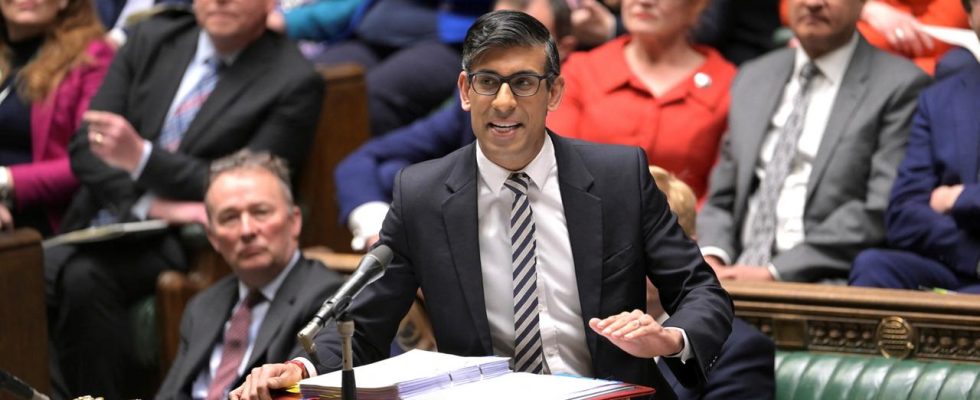Great Britain wants to deter migrants: Anyone who crosses the English Channel illegally can face internment, deportation to Rwanda and a lifelong entry ban. The House of Commons passed the law.
The British House of Commons has passed a controversial law that is intended to deny those who have entered Germany illegally the right to seek asylum and enable rapid deportations to Rwanda and other third countries. In the third reading, 289 MPs voted in favor of the illegal migration bill, while 230 voted against. The government of Prime Minister Rishi Sunak finally persuaded a number of critics in its own ranks to agree with various changes to the “Illegal Migration Bill”.
Before the law can come into force, it now goes to the House of Lords for further deliberation. Some resistance to the project is expected there, so there could be further changes. Ultimately, however, the House of Lords cannot block the draft, only delay it.
Stop unauthorized entry across the English Channel
If Sunak and his Interior Minister Suella Braverman have their way, all people who reach the British shore in small boats via the English Channel are to be interned and soon afterwards deported to Rwanda. They would then not be allowed to enter Great Britain again for life. All preparations for implementation have already been made in Rwanda. As early as the summer of 2022, government spokeswoman Yolande Makolo said the country offered legal support and translation services, as well as adequate housing.
The law, now approved in the House of Commons in London, would generally deny a right to asylum to anyone who entered the country illegally. It does not matter whether they are refugees from Syria, for example, or people from a country of origin considered safe who come to Great Britain in search of work.
The project should send a clear message, said Secretary of State for Immigration Robert Jenrick: “If you come to the UK illegally, you will not be able to build a life here”.
The law is one of the Sunak government’s priorities to discourage migrants from crossing the English Channel in small boats. In 2022, more than 45,000 people reached the UK on this route. In 2020 there were still 8,500. Before leaving the EU, the country had little to do with undesired immigration. But since Brexit there has been no readmission agreement with the EU and the issue has become increasingly important for the government.
Resistance also within the Conservatives
However, the plans that have now been passed are also controversial within the governing Conservatives. The planned measures do not go far enough, especially for the loud right wing of the Tory party. The focus of their considerations is the European Court of Human Rights (ECtHR). This had stopped a first deportation flight to Rwanda at the last minute. If necessary, the UK should leave the human rights convention, Tory hardliners are demanding. In order to appease them, the government incorporated further provisions intended to make it more difficult for a court to stop deportations.
Other leading Conservatives, such as ex-Prime Minister Theresa May, have warned that plans to discourage migrants from crossing the English Channel would ultimately result in more people living in Britain in forms of modern slavery. Currently, suspected victims of modern slavery or human trafficking are temporarily protected from deportation while their case is under review. The law, now approved, removes these protections for those who entered the UK illegally.
The handling of underage refugees also caused criticism. The organizations Refugee Council and Barnardo’s estimate that up to 15,000 unaccompanied minors could be arrested by the British authorities on the basis of the new law in the next three years. Premier Sunak did not disagree. An amendment dealing with the conditions for the internment of minors and their deportation was ultimately withdrawn.
international criticism
The law has met with harsh criticism internationally. The United Nations condemned the move as a violation of international obligations. Under the UN Refugee Convention, which also applies to Great Britain, every persecuted person has the right to apply for asylum in a safe country of their choice – regardless of how they get there.

